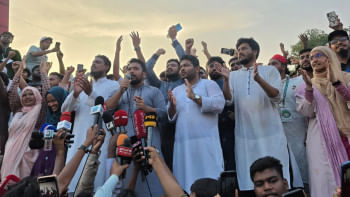The poor state of our higher education

The protest on September 9, 2015 against the imposition of 7.5 percent VAT on private university tuition fees has to be understood as a mild response of the body to a chronic illness. When a patient suffering from a chronic disease faints, the patient is taken to the hospital and given medication that provides temporary relief to the body. Unless the patient receives continuous medical treatment, the disease remains uncured and the body continues to suffer internally even though external symptoms are occasionally visible.
The student protest was similar to the body's response to the chronic illness—that is, the country's deplorable state of higher education. The body has not been cured entirely; the disease remains!
I studied at the development studies programme of a private university for a year, but did not finish my degree out of extreme academic frustration. While we had the privilege of having excellent professors as our teachers, the facilities were absolutely deplorable, and academic standards were kept intentionally low to make the degree saleable. The library was not shelved with the latest available scholarly literature nor was there any common reading room. I know some professors who resigned in protest against these practices.
Despite charging exorbitant tuition fees, private universities often fail to provide adequate facilities, which speak of their exploitative nature. Students are merely economic objects to these universities. Most of them function as corporate entities seducing students with the lure of a "golden future" that awaits them once they finish their degrees, a prospect that rarely becomes a reality.
In Bangladesh, universities in general—private or public—lack an environment for free thinking. There are mainly two types of barriers to free speech in classroom: one is an institutional restriction imposed on the academic, and the other imposed by the academic on the student. Most academics cannot speak or interact as they want because of constraints imposed by institutional guidelines.
According to Foucault, the purpose of institutions is to manufacture homogeneous minds that support a particular discourse, or rebel within limitations to challenge the status quo. The second category of restriction on free speech—imposed by the academic on the student—does not necessarily arise due to institutional restrictions on free thinking; it largely takes place due to the existence of a profound belief in the academia that students must subscribe to the views of their instructors. So instead of being trained to challenge and question the status quo, our students are being trained in a manner that promotes a particular ideology. This is a passive process of indoctrination, one that most students do not understand.
In his theory about the three faces of power, Steven Lukes argues that the manifestation of power is internalised, ingrained within individuals. As a consequence of the internalisation of a particular belief system—which, in this regard, is the intellectual correctness of the teacher as well as the intellectual inferiority of the students—the students do not protest or raise objections to such an authoritarian academic environment. On the contrary, in the Western universities, professors treat students as intellectual peers.
Liberal arts and humanities are the backbone of any civilisation as these produce thinkers who shape or create a society. Thus, the curricula of our universities need to be intellectually challenging to produce great thinkers and scholars. However, instead of grounding students in solid theoretical knowledge for better understanding and critical analysis, our liberal arts and social sciences education is centred exclusively on factual scholarly literature which does not provide nourishment for the intellect. Education at the undergraduate and postgraduate levels is still based on traditional lectures, rather than seminar sessions.
Moreover, even at the more accepted public universities, with the exception of a few departments, writing term papers are not mandatory for the students. Term papers or essays help develop critical and analytical skills as well as writing skills that are essential in the workplace. On occasions where writing papers are mandatory, students can secure respectable grades through one form of plagiarism or another.
New research suggests that there is a mismatch between skills sought by the employers and skills possessed by the graduates. As a consequence, our education system is creating a class of "educated unemployeds." This is happening because Bangladesh does not have a culture of hiring Student Assistants who will be engaged in research or other administrative tasks of the universities. They are almost non-existent, with the exception of a few job openings at the libraries, as universities do not invest sufficient funds in research. More research funds need to be allocated to create an intellectual society that would not only create an efficient workforce, but also a more tolerant society.
I think the government can enact a law making it compulsory for the universities—both public and private—to produce quality research that are of national significance. Poor-quality research is the reason Bangladeshi universities are yet to catch up with their Indian or even Pakistani counterparts.
The students might have been successful in removing VAT, but they are yet to acquire a high quality education. One of the crucial steps to attain that reform would be to make the financial information of all universities public in order to ensure the efficient utilisation of funds. In addition, academic institutions must nurture an environment of academic freedom that encourages free thinking both among the academics and the students. In addition, academics must also encourage students to think independently rather than indoctrinating them with their own ideology.
Namia Akhtar is a Masters student of South Asian Studies at Universität Heidelberg, Germany.
Email: [email protected]





Comments